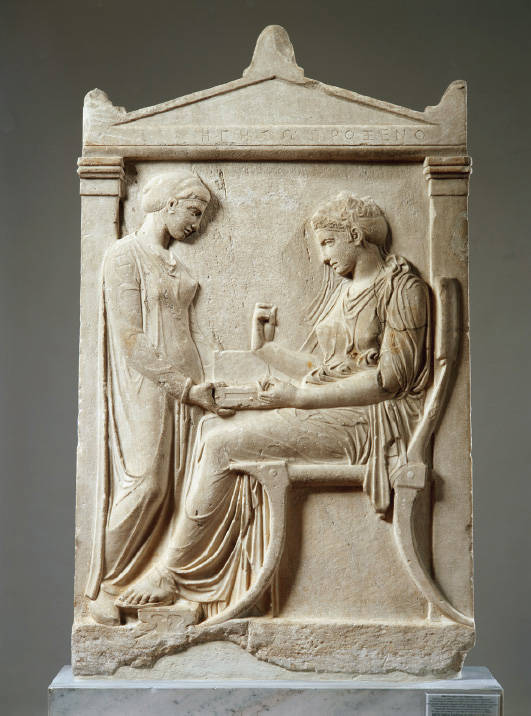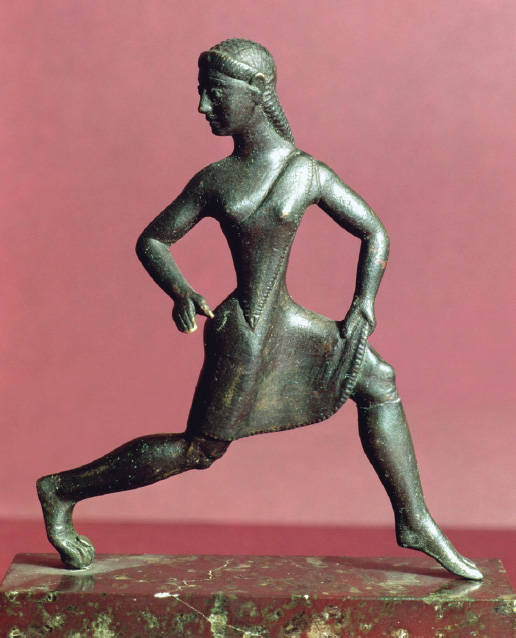Contrasting Patriarchies: Athens and Sparta
Comparison
Question
How did the patriarchies of Athens and Sparta differ from each other?
[Answer Question]
The patriarchies of second-wave civilizations not only fluctuated over time but also varied considerably from place to place. Nowhere is this variation more apparent than in the contrasting cases of Athens and Sparta, two of the leading city-states of Greek civilization (see Map 3.2). Even within this small area, the opportunities available to women and the restrictions imposed on them differed substantially. Although Athens has been celebrated as a major expression of democracy and rationalism, its posture toward women was far more restrictive than that of the highly militaristic and much less democratic Sparta.
In the several centuries between about 700 and 400 B.C.E., as the free male citizens of Athens moved toward unprecedented participation in political life, the city’s women experienced growing limitations. They had no role whatsoever in the assembly, the councils, or the juries of Athens, which were increasingly the focus of life for free men. In legal matters, women had to be represented by a guardian, and court proceedings did not even refer to them by name, but only as someone’s wife or mother.
Greek thinkers, especially Aristotle, provided a set of ideas that justified women’s exclusion from public life and their general subordination to men. According to Aristotle, “a woman is, as it were, an infertile male. She is female in fact on account of a kind of inadequacy.” That inadequacy lay in her inability to generate sperm, which contained the “form” or the “soul” of a new human being. Her role in the reproductive process was passive, providing a receptacle for the vital male contribution. Compared often to children or domesticated animals, women were associated with instinct and passion and lacked the rationality to take part in public life. “It is the best for all tame animals to be ruled by human beings,” wrote Aristotle. “In the same way, the relationship between the male and the female is by nature such that the male is higher, the female lower, that the male rules and the female is ruled.”21
As in China, elite Athenian women were expected to remain inside the home, except perhaps for religious festivals or funerals. Even within the home, women’s space was quite separate from that of men. Although poorer women, courtesans, and prostitutes had to leave their homes to earn money, collect water, or shop, ideal behavior for upper-class women assigned these tasks to slaves or to men and involved a radical segregation of male and female space. “What causes women a bad reputation,” wrote the Greek playwright Euripides in The Trojan Women, “is not remaining inside.”

Within the domestic realm, Athenian women were generally married in their mid-teens to men ten to fifteen years older than themselves. Their main function was the management of domestic affairs and the production of sons who would become active citizens. These sons were expected to acquire a literate education, while their sisters were normally limited to learning spinning, weaving, and other household tasks. The Greek writer Menander exclaimed: “Teaching a woman to read and write? What a terrible thing to do! Like feeding a vile snake on more poison.” Nor did women have much economic power. Although they could own personal property obtained through dowry, gifts, or inheritance, land was usually passed through male heirs. By law, women were forbidden to buy or sell land and could negotiate contracts only if the sum involved was valued at less than a bushel of barley.
There were exceptions, although rare, to the restricted lives of upper-class Athenian women, the most notable of which was Aspasia (ca. 470–400 B.C.E.). She was born in the Greek city of Miletus, on the western coast of Anatolia, to a wealthy family that believed in educating its daughters. As a young woman, Aspasia found her way to Athens, where her foreign birth gave her somewhat more freedom than was normally available to the women of that city. She soon attracted the attention of Pericles, Athens’s leading political figure. The two lived together as husband and wife until Pericles’ death in 429 B.C.E., although they were not officially married. Treated as an equal partner by Pericles, Aspasia proved to be a learned and witty conversationalist who moved freely in the cultured circles of Athens. Her foreign birth and her apparent influence on Pericles provoked critics to suggest that she was a hetaera, a professional, educated, high-class entertainer and sexual companion, similar to a Japanese geisha. Although little is known about Aspasia, a number of major Athenian writers commented about her, both positively and negatively. She was, by all accounts, a rare and remarkable woman in a city that offered little opportunity for individuality or achievement to its female population.
The evolution of Sparta differed in many ways from that of Athens. Early on, Sparta solved the problem of feeding a growing population not by creating overseas colonies as did many Greek city-states, but by conquering their immediate neighbors and reducing them to a status of permanent servitude, not far removed from slavery. Called helots, these dependents far outnumbered the free citizens of Sparta and represented a permanent threat of rebellion. Solving this problem shaped Spartan society decisively. Sparta’s answer was a militaristic regime, constantly ready for war to keep the helots in their place. To maintain such a system, all boys were removed from their families at the age of seven to be trained by the state in military camps, where they learned the ways of war. There they remained until the age of thirty. The ideal Spartan male was a warrior, skilled in battle, able to endure hardship, and willing to die for his city. Mothers are said to have told their sons departing for battle to “come back with your shield . . . or on it.” Although economic equality for men was the ideal, it was never completely realized in practice. And unlike Athens, political power was exercised primarily by a small group of wealthy men.
This militaristic and far-from-democratic system had implications for women that, strangely enough, offered them greater freedoms and fewer restrictions. As in many warrior societies, their central task was reproduction—bearing warrior sons for Sparta. To strengthen their bodies for childbearing, girls were encouraged to take part in sporting events—running, wrestling, throwing the discus and javelin, even driving chariots. At times, women and men alike competed in the nude before mixed audiences. Their education, like that of boys, was prescribed by the state, which also insisted that newly married women cut their hair short, unlike adult Greek women elsewhere. Thus Spartan women were not secluded or segregated, as were their Athenian counterparts.

Furthermore, Spartan young women, unlike those of Athens, usually married men of their own age, about eighteen years old, thus putting the new couple on a more equal basis. Marriage often began with a trial period to make sure the new couple could produce children, with divorce and remarriage readily available if they could not. Because men were so often away at war or preparing for it, women exercised much more authority in the household than was the case in Athens.
It is little wonder that the freedom of Spartan women appalled other Greeks, who believed that it undermined good order and state authority. Aristotle complained that the more egalitarian inheritance practices of Spartans led to their women controlling some 40 percent of landed estates. In Sparta, he declared, women “live in every sort of intemperance and luxury” and “the [male] rulers are ruled by women.” Plutarch, a Greek writer during the heyday of the Roman Empire, observed critically that “the men of Sparta always obeyed their wives.” The clothing worn by Spartan women to give them greater freedom of movement seemed immodest to other Greeks.
Nonetheless, in another way, Sparta may have been more restrictive than Athens and other Greek city-states, particularly in its apparent prohibition of homosexuality. At least this was the assertion of the Athenian writer Xenophon (427–355 B.C.E.), who stated that Sparta’s legendary founder Lycurgus “caused lovers to abstain from sexual intercourse with boys.”22 Elsewhere, however, homoerotic relationships were culturally approved and fairly common for both men and women, although this did not prevent their participants from entering heterosexual marriages as well. The ideal homosexual relationship—between an older man and a young adolescent boy—was viewed as limited in time, for it was supposed to end when the boy’s beard began to grow. Unlike contemporary Western societies where sexuality is largely seen as an identity, the ancient Greeks viewed sexual choice more casually and as a matter of taste.
Sparta clearly was a patriarchy, with women serving as breeding machines for its military system and lacking any formal role in public life, but it was a lighter patriarchy than that of Athens. The joint efforts of men and women seemed necessary to maintain a huge class of helots in permanent subjugation. Death in childbirth was considered the equivalent of death in battle, for both contributed to the defense of Sparta, and both were honored alike. In Athens, on the other hand, growing freedom and democracy were associated with the strengthening of the male-dominated, property-owning household, and within that household, the cornerstone of Athenian society, men were expected to exercise authority. Doing so required increasingly severe limitations and restrictions on the lives of women. Together, the cases of Athens and Sparta illustrate how the historical record appears in a different light when viewed through the lens of gender. Athens, so celebrated for its democracy and philosophical rationalism, offered little to its women, whereas Sparta, often condemned for its militarism and virtual enslavement of the helots, provided a somewhat wider scope for the free women of the city.